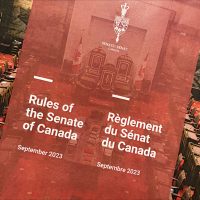Senate Renewal
How legislation is sponsored in the renewed Senate
Government bills can now be sponsored by any Senator — regardless of affiliation.
The appointment of a large and growing number of independent Senators has led to a more equitable and less partisan legislative process in the Upper Chamber. Previously, Government bills were almost exclusively sponsored by members of the governing party. Now, for each bill, the process of legislative review takes on a life of its own.
Any individual Senator can be considered for the sponsorship role — the job of championing a bill through the Senate, as well as defending it in speeches at various stages of debate.
Sponsorship is not based on a Senator’s allegiance to a political party, but rather on their expertise and support of a specific bill’s policy. Sponsors keep an open mind as debate proceeds, and as the Senate considers potential amendments (changes to a bill) or observations (messages to the Government about the bill’s contents).
This Parliamentary session has seen bills sponsored by Senators from all groups within the Senate — the Office of the Government Representative, the Independent Senators Group, the Senate Liberal caucus and the Conservative caucus.
The Government no longer has a caucus in the Upper Chamber, so the Government Representative Office cannot direct — or whip — votes on legislation. For unwhipped Senators, votes are cast according to their judgement, and within the context of the appointed chamber’s complementary relationship to the elected House of Commons.
The House of Commons can either accept, decline or modify Senate amendments. In this Parliament, the Senate has not yet insisted on amendments once rejected by the House of Commons. By the same token, during this Parliament, various Senate amendments have been accepted, either outright or in modified versions, by the Government and the House of Commons. Those accepted amendments have been generally consistent with the spirit and intent of the legislation at issue, in keeping with the complementary “review” role of the Senate.
Here are a few examples of bills currently being shaped by Senate collaboration and recommendations.





















































